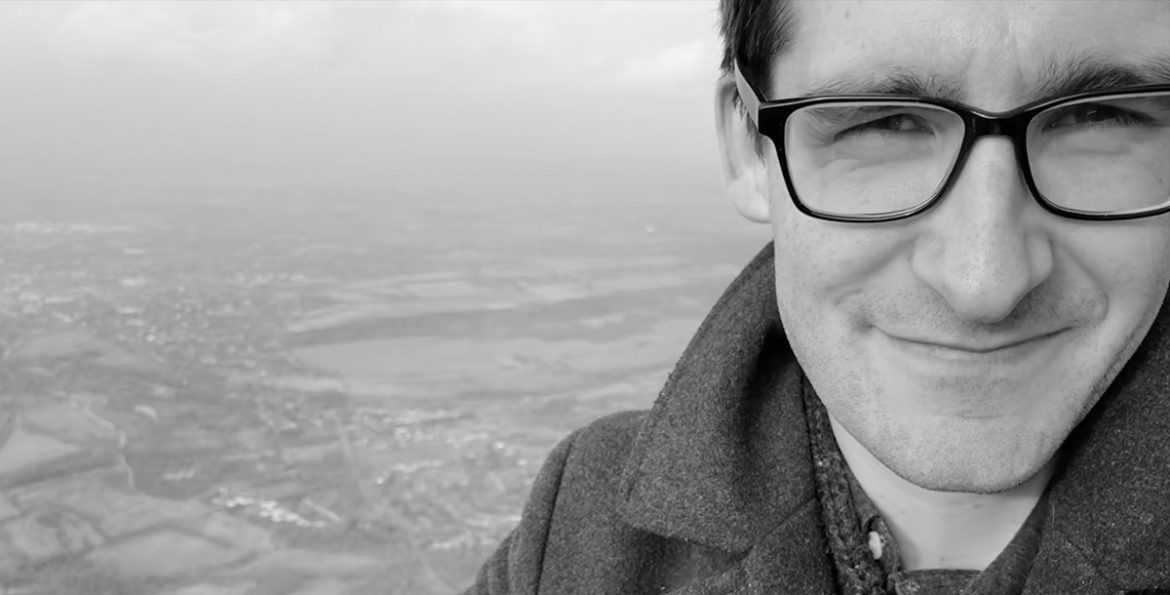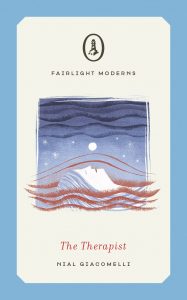

Nial Giacomelli: Interview
- 30th July 2019
- Category : Author,Blog,Interviews & Blogs
Nial Giacomelli‘s debut novella, The Therapist, was published by Fairlight Books on 1 August 2019. Nial spent his childhood between England and the US before settling in Hampshire, where he lives with his wife and two children. His novella, which originated as a science-fiction short story, deals with loss and its consequences on the people that are left behind. We’ve asked Nial some questions about his writing and his process behind The Therapist.
How did you start writing?
I started writing as a child. There was no inciting incident. I think I just gradually realised that while a book can take you away, it’s a pen that lets you ultimately decide where you end up.
Did you always want to be a writer?
I’ve always loved writing, but I never considered it as a vocation. In truth I’m not sure what draws me to it. What is a writer? Sometimes I read those ‘top ten writing tips’ compiled by various literary figures but they never seem to agree. It feels very abstract. Perhaps that’s part of the appeal?
Have you ever experimented with any other stories or formats before?
I’ve written plenty of short stories and plays. I have a habit of hiding them away in drawers once they’re finished, though.
If you could  describe The Therapist in one word what would it be?
describe The Therapist in one word what would it be?
Dreamlike.
When did you first have the idea for the novella and how long did it take you to develop it?
The story came together fairly quickly. It started life as a science-fiction short that played with the idea of memory. The themes remained, but the sci-fi elements were gradually toned down in subsequent rewrites. Fairlight asked if I would be interested in expanding it to a full-fledged novella and here we are.
Why did you decide to leave the ending ambiguous and open to interpretation?
The Therapist deals heavily with bereavement. After we suffer a loss I think there’s a tendency to obsessively analyse, to look retrospectively at our own culpability. The book ends ambiguously because there’s a conscious shift on the part of the protagonist. A look away from the immutability of the past and towards the uncertainty of the future.
The world you create is a mysterious one; how challenging was it to walk on the line between the real and the fantastical?
While the book deals with increasingly fantastical elements I tried to anchor them in a way that felt emotionally authentic. I feel like books become places in the mind. They have their own sense of logic and gravity. Part of the fun is playing with those constraints.
What’s the most surprising thing you’ve learned through your writing?
I’ve gained a much greater appreciation for all of the work that goes on behind-the-scenes when it comes to publishing a book. Many experienced hands touch a manuscript and for that I am supremely grateful.
As far as the most surprising thing, it’s probably some of the bizarre facts I’ve come across while researching various stories. Did you know that in medieval Europe animals were routinely sentenced for committing grievous crimes? Some pigs were even dressed in waistcoats for their trials. And the largest living organism on Earth? Turns out it’s a two-mile-wide mushroom growing under the Blue Mountains in Oregon.
What has been the hardest part of The Therapist to write?
The therapist herself. Mainly because I wanted to avoid making a statement regarding the therapeutic process and instead focus on the personal cost of ignorance.
What do you hope people take away from reading The Therapist?
That time is precious and words of endearment are a commodity we should bankrupt ourselves of at every opportunity.
What do you think makes a good novella?
The same thing that makes any story great: an idea that transcends the medium and characters that stay with you.
What does writing mean to you?
I think it’s one of the purest forms of self-expression, and also one of the most vulnerable.
What inspires your writing?
It’s nice to frame a problem as fiction and consider it from alternate perspectives.
Do you have a writing schedule?
No specific schedule. I procrastinate, so I avoid working on an idea as soon as it hits me. If something is worth capturing it tends to linger.
Where do you tend to write?
In my home office late at night when the world (or at least my little part of it) is quiet.
What’s your favourite book/author?
Oh boy. I wouldn’t like to say. It changes day-to-day, book-to-book. I thought that George Saunders’ Lincoln in the Bardo was utterly beautiful.
Do you have a pet peeve when it comes to writing?
There are certain tropes, sure. When it comes to my own writing: I usually just wish it was better.
Do you have a writer’s habit that helps you ‘get in the zone’?
Nothing particular. I feel like writing is a strange enough habit in-and-of itself.
Do you feel like your writing style has changed over the years you’ve been writing?
I hope so. I think there’s a paradox where writing is concerned. You broaden your own creative horizon by consuming the work of others, but the more you read the less accomplished and capable you feel.
What’s a piece of advice you can give to aspiring authors?
It sounds like something you’d find on one of those terrible motivational posters but: never stop being an aspiring author. What do you do after you put out a book? You try to write another one. Either to hone the craft, to strengthen your message, or to make reparations for those that have come before.
Place your order for The Therapist here, or for book bundle options for the Fairlight Moderns visit our online shop.














